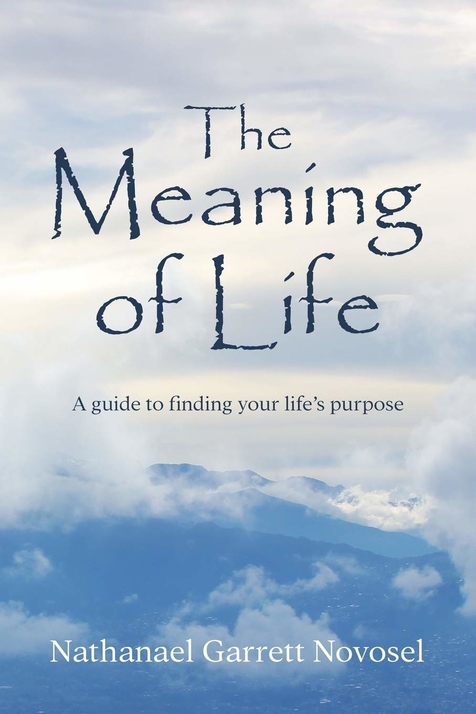A professional researcher has considered and compiled data from various fields to create a goal-oriented exploration of life’s meaning in the informative and impassioned The Meaning of Life: A Guide to Finding Your Life’s Purpose.
At the outset of the comprehensive tome, author Nathanael Garrett Novosel offers a “Pre-Book Assessment,” allowing the reader to rate his/her current “ability to derive meaning from life,” with a simple analysis of the resulting rating. He propounds that no important information about how to live can come from one of our most basic questions: How did life come to be? Instead, we should look at how life works, because this is a pragmatic question offering objective answers.
He offers a list of eight essential principles needed in examining his subject matter, stressing that the reader must think about and come to understand what life is before attempting to develop a strategy for how to live. These principles are reiterated throughout the manual, scrutinized in detail with one chapter for each.
Novosel’s basic thesis is that one’s individually unique life is founded on growth, which is derived from one’s experience, which is motivated by desires, and these are in turn shaped by one’s beliefs. Emotions play a role, by giving people clues as to their intended direction. Ethics are necessary to oversee how one should act and react in harmony with others. To progress, one will need support from others. Ultimately, the choices one makes will form life’s destiny.
Humans can grow in numerous ways: intellectually, physically, spiritually, and more. Your experiences will lead you to the best areas for growth, and without experiences, life would be boring and stagnant. Our experiences are based on feelings – analysis of why we want certain things and how that has affected us in the past can guide us to making better choices now. Thus desire can lead to drive, and drive, to accomplishment. But ethics are also necessary – we need to limit our emotionally-based choices by devising a set of rules pertaining to the good of all. If you fail to consider others you may begin to fail in the pursuit of your goals for lack of support.
If all of that sounds somewhat clinical, or at least heavily methodical, that is why the book is effective. With a title like The Meaning of Life, Novosel gave himself a tall order, along the lines of a self-help “Theory of Everything,” and the book’s fairly scientific approach to standard issues of self-help is unique and eye-opening. Many books on self-improvement rely on bromides, but Novosel’s aim is to put these tenets into actual practice, so the book has a chance to be more effective.
The book’s energetically structured guidelines for understanding life’s possibilities and utilizing them to best effect includes exercises for the reader to undertake at the end of each chapter. He concludes with a glossary of such terms as “conditional probability” and “optimism bias.” While this type of vocabulary may not be appealing to every reader, Novosel successfully cuts through the vague language often found in this field.
Most of all, it’s clear from Novosel’s material that he has a genuine zeal for helping interested readers to succeed. Useful both as a personal self-help guide and as a potential tool for self-help professionals, The Meaning of Life is uniquely well-expressed and and should be helpful to a broad array of readers.
Book Links
STAR RATING
Design
Content
Editing
Get an Editorial Review | Get Amazon Sales & Reviews | Get Edited | Get Beta Readers | Enter the SPR Book Awards | Other Marketing Services
























Leave A Comment